Project news
November 2022: New Publication in Plants
Mthandazo Dube and Boingotlo Raphane, both PhD students from TRISUSTAIN, published an article in Plants journal.
Schistosomiasis and soil-transmitted helminths are some of the priority neglected tropical diseases targeted for elimination by the World Health Organization. Although Botswana has a modern healthcare system, many people rely on traditional medicine to treat worm infections and schistosomiasis. In this study, ten plant species used by traditional health practitioners against worm infections were collected and tested against a set of species in vitro. Extracts of two plants, Laphangium luteoalbum and Commiphora pyaracanthoides, displayed promising anthelmintic activity against newly transformed schistosomas and adult Schistosoma mansoni. L. luteoalbum displayed 85.4% activity at 1 μg/mL against Newly Transformed Schistosoma, while Commiphora pyracanthoides displayed 78.5% activity against adult S. mansoni at 10 μg/mL. The anthelmintic activity shown by the plant samples demonstrates the importance of traditional medicine, as traditional health practitioners have knowledge about which plants to use against various ailments. Further investigations need to be carried out in order to identify the active principles in the plant extracts and validate the safety of the plant extracts through toxicological studies.
https://www.mdpi.com/2223-7747/11/21/2945
November 2022: Successful PhD Defense
Alphonce Marealle from TRISUSTAIN has successfully defended his doctoral thesis. In his work, he describes the Search for Potential Anti-HIV-1 and Antimycobacterial Compounds from Selected Tanzanian Medicinal Plants. The study was supervised by Profs. Mainen Moshi, Ester Innocent (both MUHAS) and Kerstin-Andrae-Marobela (UoB). A kind compliment goes to Dr. Marealle for his achievements. We appreciate his contribution to the project and wish him the very best for his future career.
March 2022: New Publication in Plants
Ester Innocent, Alphonce Ignace Marealle, Peter Imming and Lucie Moeller from TRISUSTAIN published an article in Plants journal.
The review comprehensively covers and analyzes scientific information on plants used in Tanzanian traditional medicine against respiratory diseases. It covers ethnobotanical and ethnopharmacological information extracted from SciFinder, Google Scholar, and Reaxys as well as the literature collected at the Institute of Traditional Medicine in Dar-es-Salaam. Crude extracts and fractions of 133 plant species have literature reports on antimicrobial bioassays. Of these, 16 plant species had a minimum inhibitory activity of MIC ≤ 50 µg/mL. Structurally diverse compounds were reported for 49 plant species, of which 7 had constituents with MIC ≤ 5 µg/mL against various bacteria: Bryophyllum pinnatum (Lam.) Oken, Warburgia ugandensis Sprague, Diospyros mespiliformis Hochst. ex DC., Cassia abbreviata Oliv., Entada abyssinica A. Rich., Strychnos spinosa Lam., and Milicia excelsa (Welw.) C.C. Berg. The low number of antimicrobial active extracts and compounds suggests that antibacterial and antimycobacterial drug discovery needs to have a fresh look at ethnobotanical information, diverting from too reductionist an approach and better taking into account that the descriptions of symptoms and concepts of underlying diseases are different in traditional African and modern Western medicine. Nevertheless, some structurally diverse compounds found in anti-infective plants are highlighted in the review as worthy of detailed study and chemical modification.
https://www.mdpi.com/2223-7747/11/7/931/htm
December 2021: New Publication in Molecules
Betelhem Sirak, master student at AAU, has recently published an articel in Molecules jounal. The work was supported by PhytoWoodSynergies.
Leishmaniasis and schistosomiasis are neglected tropical diseases (NTDs) infecting the world’s poorest populations. Effectiveness of the current antileishmanial and antischistosomal therapies are significantly declining, which calls for an urgent need of new effective and safe drugs. In Ethiopia fresh leaves of Ranunculus multifidus Forsk. are traditionally used for the treatment of various ailments including leishmaniasis and eradication of intestinal worms. In the current study, anemonin isolated from the fresh leaves of R. multifidus was assessed for its in vitro antileishmanial and antischistosomal activities. Anemonin was isolated from the hydro-distilled extract of the leaves of R. multifidus. Antileishmanial activity was assessed on clinical isolates of the promastigote and amastigote forms of Leishmania aethiopica and L. donovani clinical isolates. Resazurin reduction assay was used to determine antipromastigote activity, while macrophages were employed for antiamastigote and cytotoxicity assays. Antischistosomal assays were performed against adult Schistosoma mansoni and newly transformed schistosomules (NTS). Anemonin displayed significant antileishmanial activity with IC50 values of 1.33 nM and 1.58 nM against promastigotes and 1.24 nM and 1.91 nM against amastigotes of L. aethiopica and L. donovani, respectively. It also showed moderate activity against adult S. mansoni and NTS (49% activity against adult S. mansoni at 10 µM and 41% activity against NTS at 1 µM). The results obtained in this investigation indicate that anemonin has the potential to be used as a template for designing novel antileishmanial and antischistosomal pharmacophores.
https://doi.org/10.3390/molecules26247473
December 2021: New Publication in Biomolecules
Mthandazo Dube, PhD student in Trisustain, has recently published an article in Biomolecules.
Ozoroa insignis Del. is an ethnobotanical plant widely used in traditional medicine for various ailments, including schistosomiasis, tapeworm, and hookworm infections. From the so far not investigated fruits of Ozoroa insignis, the anthelmintic principles could be isolated through bioassay-guided isolation using Caenorhabditis elegans and identified by NMR spectroscopic analysis and mass spectrometric studies. Isolated 6-[8(Z)-pentadecenyl] anacardic (1), 6-[10(Z)-heptadecenyl] anacardic acid (2), and 3-[7(Z)-pentadecenyl] phenol (3) were evaluated against the 5 parasitic organisms Schistosoma mansoni (adult and newly transformed schistosomula), Strongyloides ratti, Heligmosomoides polygyrus, Necator americanus, and Ancylostoma ceylanicum, which mainly infect humans and other mammals. Compounds 1–3 showed good activity against Schistosoma mansoni, with compound 1 showing the best activity against newly transformed schistosomula with 50% activity at 1_M. The isolated compounds were also evaluated for their cytotoxic properties against PC-3 (human prostate adenocarcinoma) and HT-29 (human colorectal adenocarcinoma) cell lines, whereby compounds 2 and 3 showed antiproliferative activity in both cancer cell lines, while compound 1 exhibited antiproliferative activity only on PC-3 cells. With an IC50 value of 43.2 µM, compound 3 was found to be the most active of the 3 investigated compounds.
https://doi.org/10.3390/biom11121893
Novermber 2021: New Publication in Molecules
The leaves of Ranunculus multifidus Forsk. are traditionally used for the treatment of malaria in several African countries. In the present study, 80% methanol (RM-M) and hydrodistilled (RM-H) extracts of fresh leaves from R. multifidus and its major constituent anemonin were tested for their in vivo antimalarial activity against Plasmodium berghei in mice. Anemonin was also tested for its in vitro antimycobacterial activity against Mycobacterium smegmatis and M. abscessus in a microbroth dilution assay. Results of the study revealed that both RM-M and RM-H were active against P. berghei in mice. However, anemonin did not inhibit the growth of M. smegmatis and M. abscessus. The work was supported by the Federal Ministry of Education and Research (BMBF) (grant number 01DG17042B) in the context of the PhytoWood-Synergies project.
https://doi.org/10.3390/molecules26206179
June 2021: Visiting PhD students from Ethiopia
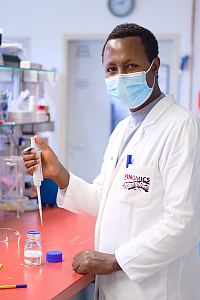
Mr. Admassu Assen Adem, PhD student arrived at MLU's IADP on 07 June for his three-month research stay. Admassu is working on the formulation of nanogels and nanoemulsion gels. The formulations are loaded with phytoceramides extracted from lupine seeds. During his stay, the formulations will be evaluated for their release and penetration.
June 2021: New Scientific Publication
Birhanu Nigusse Kahsay, PhD student sponsored by Addis Ababa University (AAU), has recently published an article entitled “Free amino acid contents of selected Ethiopian plant and fungi species: a search for alternative natural free amino acid sources for cosmeceutical applications” in Amino Acids. The study is a part of the project Phytosustain funded by German Academic Exchange Service (DAAD) and Federal Ministry of Education and Research (BMBF), Germany.
https://doi.org/10.1007/s00726-021-03008-5
Free amino acids (FAAs), the major constituents of the natural moisturizing factor (NMF), are very important for maintaining the moisture balance of human skin and their deficiency results in dry skin conditions. There is a great interest in the identification and use of nature-based sources of these molecules for such cosmeceutical applications. The objective of the present study was, therefore, to investigate the FAA contents of selected Ethiopian plant and fungi species; and select the best sources so as to use them for the stated purpose. About 59 different plant species and oyster mushroom were included in the study and the concentrations of 27 FAAs were analyzed. Each sample was collected, lyophilized, extracted using aqueous solvent, derivatized with Fluorenylmethoxycarbonyl chloride (Fmoc-Cl) prior to solid-phase extraction and quantified using Liquid Chromatography Electrospray Ionization Tandem Mass Spectrometric (LC-ESI–MS/MS) system. All the 27 FAAs were detected in most of the samples. The dominant FAAs that are part of the NMF were found at sufficiently high concentration in the mushroom and some of the plants. This indicates that FAAs that could be included in the preparations for the management of dry skin condition can be obtained from a single natural resource and the use of these resources for the specified purpose have both economic and therapeutic advantage in addition to fulfilling customer needs.
March 2021: School Project in Ethiopia
The Trisustain Project is pleased to link to an Ethiopian charity, Noble
Action, that provides education to children in Monopole in rural
Ethiopia. One of the Ethiopian scientists in Trisustain supports the
school project by serving as Vice Chair of the Executive Board. Since
higher education and research is not possible without a sound basis, we
encourage supporting the school project.
See https://www.nobleahd.org/ for more information.
February 2021: A Scientific Publication by a TRI-SUSTAIN Team
A TRI-SUSTAIN Team composed of researchers from Addis Ababa University (Tesfaye Gabriel, Anteneh Belete and Tsige Gebre-Mariam) and Martin-Luther-University (Gerd Hause and Reinhard H. H. Neubert) published a scientific article entitled "Isolation and characterization of cellulose nanocrystals from different lignocellulosic residues: A comparative study” in the Journal of Polymers and the Environment.
https://link.springer.com/article/10.1007/s10924-021-02089-3
Cellulose nanocrystals (CNCs) have captured the interest of researchers and industries. CNCs find several functional applications including in drug delivery, nanomaterial synthesis, protein or enzyme immobilization, tissue engineering, and reinforcement of composite materials. Woody plants and cotton are the major sources of cellulose and CNCs. However, factors such as economic and environmental concerns have forced researchers and stakeholders to look for other potential substitutes. This article explores alternative sources of CNCs from four abundant plant residues in Ethiopia: teff (Eragrostis tef, Poaceae) straw, enset (Ensete ventricosum, Musaceae) fiber, sugarcane (Saccharum officinarum, Poaceae) bagasse and coffee (Coffea arabica, Rubiaceae) hull. All the CNCs isolated from the four sources exhibited high crystallinity, colloidal and thermal stability though CNCs obtained from enset fiber exhibited superior properties in terms of yield, crystallinity and crystal size.
The manuscript is part of a PhD research work by Tesfaye Gabriel, sponsored by Addis Ababa University and financially supported by
TRI-SUSTAIN Project.
February 2021: Prof. Mary Justin-Temu from MUHAS gave an interview to Jambo Bukoba e.V.
On the occasion of the “International Day of Women and Girls in Science” on February 11th, Prof. Mary Justin-Temu from MUHAS gave an interview to the non-profit association Jambo Bukoba e.V.
The interview is about Prof. Justin-Temu´s professional career and opportunities and difficulties for females in science in Tanzania. Jambo Bukoba e.V. was founded in 2008 by the former banker Clemens Mulokozi from Munich, Germany.
The aim of the association is to improve living conditions for children in Tanzania. Therefore, they organize workshops for sport teachers where they learn to integrate valuable life skills into their lessons. Another aspect of their concept is to achieve equality for children of both sexes. One focus of the program is health education for young people to stop the transmission of HIV/AIDS.
Click here to get to the interview.
January 2021: New Publication in the Journal of Medicinal Plants Research
Alphonce Ignace Marealle, PhD student at Muhimbili University of Health and Allied Sciences (MUHAS) under Profs. Mainen Moshi, Ester Innocent and Kerstin-Andrae Marobela in Tri-Sustain project published an article entitled "Ethnomedical survey of plants used for the management of HIV and AIDS-related conditions in Mbulu District, Tanzania." The publication appeared in the Journal of Medicinal Plants Research
The aim of this Study was to document medicinal plants used in the management of HIV and AIDS-related conditions in Mbulu District. An ethnomedical survey was conducted using a semi-structured questionnaire. The main HIV and AIDS-related conditions considered during this study were; cough, frequent fevers, diarrhea, weight loss, oral thrush, genital warts, candidiasis, abscesses, skin rashes, shingles and venereal diseases. Literature survey was also carried out to compile supplementary data on ethnomedical used and pharmacological activities of the respective plants. Thirty seven plant species from 23 families were reported. The plant families with the highest number of documented species were Acanthaceae, Caesalpiniaceae, Compositae and Verbanaceae with three species each. Literature information on the 37 reported plant species showed that, 23 plants could be linked to supporting data on ethnomedical uses, 23 were related to biological activity and 12 had been reported to display varying activities against HIV-1. Sixteen identified medicinal plants recorded new ethnomedical uses related to HIV and AIDS-related conditions, while 8 and 16% of the plant species did not have any previously reported ethnomedical uses or pharmacological activities, respectively.
https://academicjournals.org/journal/JMPR/article-abstract/C3B7BAD65784
December 2020: New Publication in the European Journal of Medicinal Plants
Alphonce Ignace Marealle, PhD student at Muhimbili University of Health and Allied Sciences (MUHAS) under Profs. Mainen Moshi, Ester Innocent and Kerstin-Andrae Marobela in Tri-Sustain project published an article entitled “Ethnopharmacological Survey of Medicinal Plants Used in the Management of HIV and AIDS-Related Conditions in Makete District, Southern Highlands of Tanzania”. The publication appeared in the European Journal of Medicinal Plants.
Traditional health practitioners in Tanzania have been consulted by HIV and AIDS patients for over thirty-five years since the first case was detected in 1984. Experiences have accumulated over decades involving the use of traditional medicines for the management of conditions related to the syndrome. The aim of the present study was to document medicinal plants used in the management of HIV and AIDS-related conditions in Makete District, Tanzania. Thirty-seven plant species representing 36 genera and 27 families were documented for the treatment of different HIV and AIDS-related conditions. Compositae and Leguminosae families represented the highest number of documented species with five species each. Twelve and 15 species did not have previously reported ethnopharmacological or pharmacological activities, respectively. Thirteen species have been previously reported for similar ethnopharmacological uses and 12 species had literature reports on respective biological activities. Nine species have reported antiviral activity and seven of them are reported to display specific activities against HIV-1.
https://doi.org/10.9734/ejmp/2020/v31i1430317
October 2020: Publication in the Journal of Pharmaceutical and Biological Analysis
Admassu Assen Aden, PhD student of Addis Ababa University under
Profs. Tsige Gebre-Mariam and Reinhard Neubert and supported by Trisustain, is the first author of a comprehensive original publication on plant-derived ceramides (CERs). The publication appeared in the Journal of Pharmaceutical and Biomedical Analysis.
Its results deliver on a major goal of Trisustain, viz. economical and sustainable provision of African plant-derived pharmaceutical excipients. Ceramides play a major role in skin barrier function. Replacement of depleted skin CERs, due to skin disorder or aging, has beneficial effects in improving skin barrier function and skin hydration. Though plants are a reliable source of CERs, the absence of economical and effective methods of hydrolysis to convert the dominant plant sphingolipids, glucosylceramides (GlcCERs), into CERs remains a challenge. Admassu et al. found alternative GlcCERs sources and a chemical method of hydrolysis to provide plant-derived CERs for dermal application. They isolated GlcCERs from lupin beans (Lupinus albus), mung beans (Vigna radiate) and naked barley (Hordium vulgare), followed by mild acid hydrolysis after treating the GlcCERS with an oxidizing and reducing agent consecutively. The method is economical and effective which potentiates the commercialization of plantCERs for dermal application.
https://doi.org/10.1016/j.jpba.2020.113677
August 2020: Two project partners from Botswana and Germany are member of a team who published a research article with the title "The African natural product knipholone anthrone and its analogue anthralin (dithranol)
enhance HIV-1 latency reversal"
Prof. Dr. Kerstin Andrae Marobela (University Botswana) and Prof. Dr. Peter Imming (Martin Luther University) were a part of the research team who published a paper with the title "The African natural product knipholone anthrone and its analogue anthralin (dithranol) enhance HIV-1 latency reversal" in the Journal of Bioogical Chemistry.
The article describes two novel latency-reversal agents (LRAs), knipholone anthrone and its basic building blockanthralin (dithranol) that can be used in the HIV therapy for the elimination of the latent and replication-competent provirus. The “shock-and-kill” pharmacological approach aims to reactivate provirus expression in the presence of antiretroviral therapy and target virus-expressing cells for elimination. However, no latency-reversal agent to date effectively clears viral reservoirs in humans, suggesting a need for new LRAs LRA combinations. Therefore, the autors screened 216 compounds from the pan-African Natural Products Library and identified two compounds that reverse viral latency at low micromolar concentrations in multiple cell lines. These coumpounds enhance the activities of multiple “shock-and-kill” agents, which in turn may inform ongoing LRA combination therapy efforts.
https://www.jbc.org/content/early/2020/08/11/jbc.RA120.013031.1.full.pdf
May 2020: Tesfaye Gabriel Dalalo and co-authors published scientific article "Extraction and characterization of celluloses from various plant byproducts"
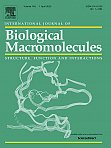
Mr. Tesfaye Gabriel Dalalo, a doctoral student at the Addis Ababa University, and four co-authors from Ethiopia and Germany published a scientific article in the International Journal of Biological Macromolecules entitled "Extraction and characterization of celluloses from various plant by-products". The authors describe the use of teff straw, enset fiber, sugarcane bagasse and coffee hull agro-industrial by-products, which are produced in large quantities in Ethiopia, for the isolation of cellulose. The results show that cellulose from enset fibers in particular provided unique physicochemical properties. However, all the by-products examined could be seen as alternative cellulose sources for potential industrial applications with added value.
Research for this publication was supported by the University of Addis Ababa, the Ministry of Science and Technology, Ethiopia and the TriSustain project.
https://doi.org/10.1016/j.ijbiomac.2020.04.264
March 2020: Admasssu Assen is working on plant derived ceramides at IADP, Halle (Saale)
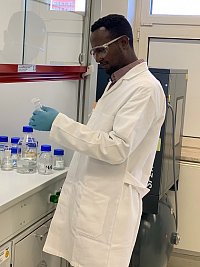
Admassu Assen at IADP 2020
Mr. Admassu Assen, PhD student, arrived on March 3 for his three months research stay at the Institute of Applied Dermatopharmacy (IADP/Skinomics), MLU. Admassu is working on plant derived ceramides extracted from Ethiopian plants intended for topical application. During his stay he will be working on developing optimized nanoemulgel formulation loaded with plant derived ceramides.
March 2020: Eyael Tewelde learns anthelmintic assays at IPB, Halle (Saale)
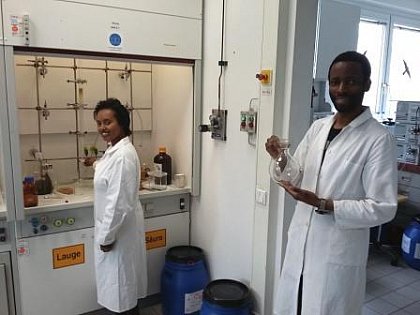
Eyael Tewelde Habtemariam (left) and Mthandazo Dube (right) working in a lab of IPB
Ms. Eyael Tewelde Habtemariam is master student at Addis Ababa University, Ethiopia, working on the Wood Cluster project. In March, Eyael came to Halle (Saale) for her three-month research stay. She is working at the IPB under the direction of Mthandazo Dube, a PhD student in Tri-Sustain project. The aim of her work is to learn the anthelmintic assay to test the anthelmintic activities of Ethiopian medicinal plants.
December 2019: Mthandazo Dube goes on a field trip to collect anthelmintic plants
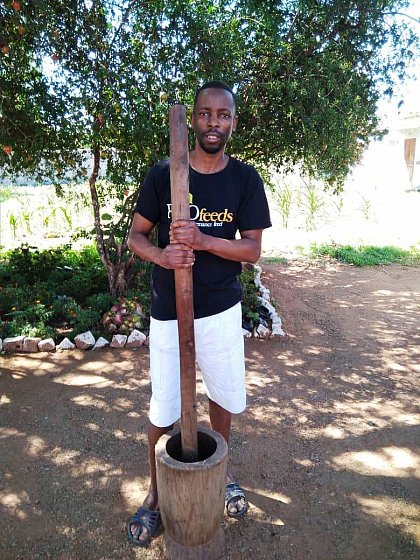
Mthandazo Dube processing plant samples
In December 2019 Mthandazo Dube, a PhD student at the MLU went to Botswana to collect plants that are used in traditional medicine against parasitic worms. He collected a total of 25 samples that he will test against the free living nematode Caenorhabditis elegans with the hope of isolating anthelmintic compounds.
December 2019: Birhanu Nigusse Kahsay successfully completes his research stay at the MLU
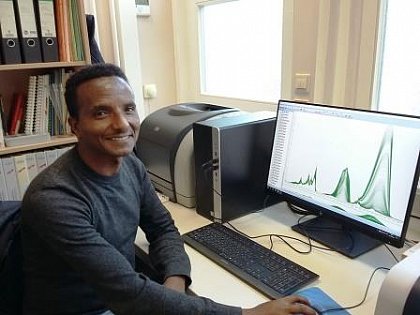
Birhanu Nigusse Kahsay working on an ATR-FTIR spectrometer at the MLU
Birhanu Nigusse Kahsay came to Martin Luther University, Institute of Pharmacy in September 2019 for his three-month research stay. During his stay, he has developed topical preparations with moisturizing properties using extracts obtained from Ethiopian plants. To achieve this goal, Birhanu used a number of methods such as HPLC-MS/MS and attenuated total reflection infrared spectroscopy (ATR-FTIR) to characterize the prepared formulations.
November 2019: Alphonce Ignace Marealle arrives at the Department of Biological Science, University of Botswana for 7 weeks research stay
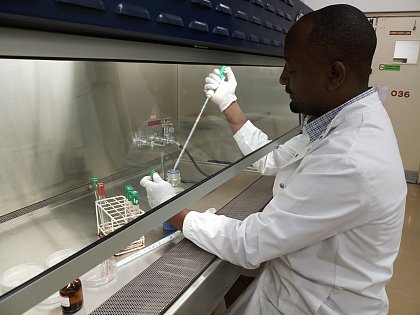
Alphonce in one of the laboratories in the Department of Biological sciences, University of Botswana (Source: Katlego Makale)
Alphonce Ignace Marealle is a PhD student at the Muhimbili University of Health and Allied Science, Tanzania. At the University of Botswana Alphonce will test extracts from selected Tanzanian medicinal plants for their anti-HIV activity under the supervision of Prof. Dr. Kerstin Andrae-Marobela. In addition, Alphonce will screen the plant extracts for antimycobacterial activity using Mycobacterium aurum as a model for Mycobacterium tuberculosis - the most common cause of death of people living with HIV/AIDS.
November 2019: Prof. Dr. Eliangiringa Kaale gives a leacture at the MLU
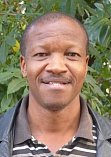
On November 7, 2019, Prof. Eliangiringa Kaale visited the MLU and gave a lecture on "Challenges in setting up laboratories for quality control of medicines in low- and middle-income countries - Africa as an example". In his presentation, Prof. Kaale highlighted the possibility of use of thin-layer chromatography as a simple method for quality control of medicines in countries where high-tech services are lacking.
September 2019: Tesfaye Gabriel Dalalo for a research stay at the Institute of Applied Dermatopharmacy in Halle
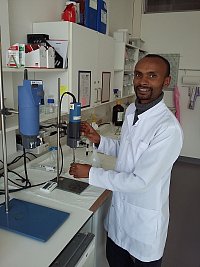
Tesfaye Gabriel Dalalo from Ethiopia in the laboratories of IADP
Tesfaye Gabriel Dalalo, a PhD student from Addis Ababa University, Ethiopia, started his research stay at the Institute of Applied Dermatopharmacy in Halle (Saale). Tesfaye is working on the preparation of cellulose based nanocarriers from Ethiopian plant biomasses for controlled drug delivery. During his stay in Halle he plans to expand his methodical knowledge in analyzing cellulose-based nanoparticles and nanogel formulations. His research visit will last until the end of November.
September 2019: 4th TRI-SUSTAIN Graduate School at the Martin Luther University Halle-Wittenberg
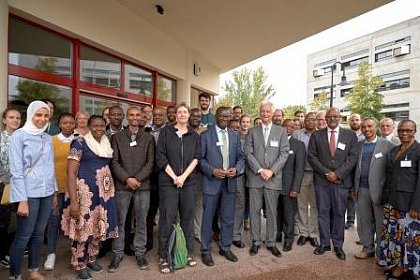
Participants of the Opening Ceremony of the 4th TRI-SUSTAIN Graduate School in Halle (Saale) (Foto: Dr. Adrian Richter, MLU)
The fourth TRI-SUSTAIN Graduate School was opened on 16 September 2019 by the Rector of Martin Luther University, Prof. Dr. Christian Tietje. Welcome addresses were given by Dr. Karamba Diaby, Member of the German Bundestag, Prof. Dr. Dietrich H. Nies, Dean of the Faculty of Biosciences at MLU, Ms. Karin Essig, DAAD Team Leader for Cooperation Projects in Africa and India, Prof. Dr. Tsige Gebre-Mariam, University of Addis Ababa (AAU) and President of the Ethiopian Academy of Sciences, and Prof. Dr. Mary Justin-Temu, Muhimbili University of Health and Allied Sciences (MUHAS), Tanzania.
During the ten-day Graduate School, the PhD students presented the progress of their work and attended laboratory courses on isolation of natural compounds and analytical methods (high-performance thin-layer chromatography, capillary electrophoresis, gas chromatography - mass spectrometry, nuclear magnetic resonance) offered by the Institute of Pharmacy, the Institute of Applied Dermatopharmacy and the Leibniz Institute of Plant Biochemistry. The students were instructed in the use of in silico methods for searching active plant constituents. Last not least, Univations GmbH Halle taught them business planning. Scientific talks were delivered by senior researchers from Germany (MLU, Leibniz Institute of Plant Biochemistry Halle, University of Potsdam) and Africa (AAU, MUHAS, University of Botswana). Highlight of the framework program was a one-day visit to the German Bundestag, facilitated by Dr. Diaby.
July 2019: PhytoWood Synergies: Field trip to southern Ethiopia
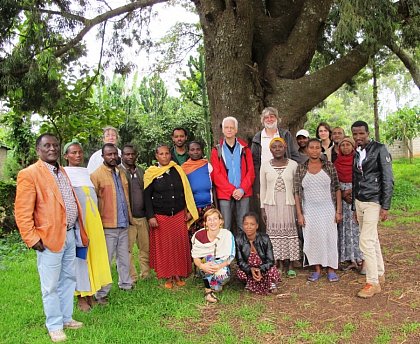
Local farmers and scientists in Chefasine village.
Left: Prof. Tseagye Bekele; right: the village leader; centre kneeling Dr. Maxi Domke (TU Dresden) and the wife of the village leader; centre standing: Prof. Imming (MLU) and Prof. Pretzsch (TUD).
Two projects in the BmBF/DAAD-funded "Sustainable Partnerships with Subsaharan Africa" programme join forces, again supported by BmBF, to provide a model study: Will planting indigeneous medicinal plants create an independent source of income for small farmers? The model study is located in rural Ethiopia near the city of Hawassa. The project WoodCluster (Chair of Tropical Forestry of TU Dresden at Tharandt) investigates socioeconomic aspects of biomass production, processing and marketing, focussing on wood. Together with us (Trisustain), they expand their analysis to medicinal plants. Trisustain will validate scientifically (or invalidate ...) if a selection of Ethiopian plants are indeed anthelminthic as claimed by their traditional use. On the Ethiopian side, Prof. Kaleab Asres (School of Pharmacy, Addis Ababa University) is included as a scientist with longstanding expertise in Ethiopian medicinal plants. Prof. Tsegaye Bekele (Wondo Genet College of Forestry and Natural Resources, Hawassa University) provides scientific
support locally.
25-28 July 2019, the partners met, first in Addis Ababa, then in Hawassa and in the village Chefasine where the farms are located. The status of the project was inspected and next steps discussed.
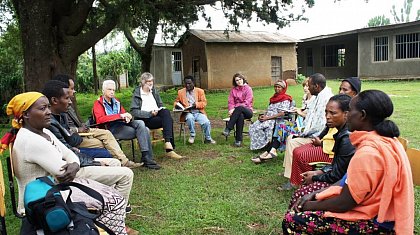
Farmers and scientists planning and discussing in Chefasine
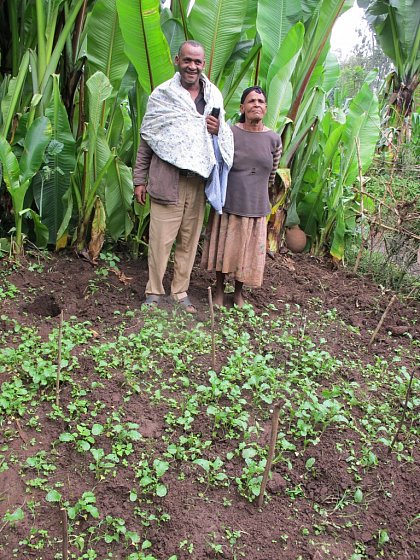
One of ten plots of land with a selected potentially anthelminthic plant. For the initial phytochemical and pharmacological analysis, only a small amount of plant material is needed.
July 2019: Prof. Dr. Kerstin Andrae-Marobela started her guest professorship at the Martin Luther University
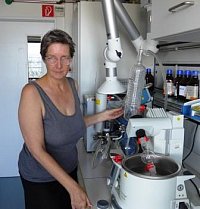
Prof. Kerstin Andrae-Marobela at the Institute of Pharmacy, MLU
Prof. Marobela from the University of Botswana came to Halle for a guest professorship for three months. She brought extracts of plants that show activity against HIV and will analyze their composition and characterize the substances. As part of her visiting professorship, Prof. Marobela will be offering a series of lectures (see the program link under the text).
Program of the lecture series of Prof. Dr. Kerstin Andrae-Marobela in the scope of her guest professorship at the MLU
Prof Andrae Marobela_Lecture series 2019.pdf
(375,6 KB) vom 26.07.2019
June 2019: Prof. Tsige Gebre-Mariam from the Addis Ababa University arrived Halle
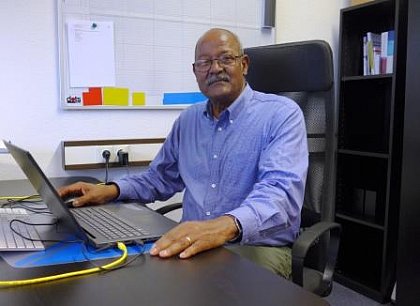
Prof. Tsige Gebre-Mariam at the Institute of Applied Dermatopharmacy
In June 2019 Prof. Tsige Gebre-Mariam came to Halle. His stay here is part of the Georg Forster Research Award, that he received in 2016 from the Alexander von Humbold Foundation. Prof. Tsige works at the Institute of Applied Dermatopharmacy and stays for three months until the end of August. One of the main purposes of his stay is to strengthen existing relationships and establish new contacts between the University of Addis Ababa and the institutes of Martin Luther University.
We wish Prof. Tsige a pleasant and fruitful stay in Halle.
June 2019: Mamo Feyissa Senbeta conducting a focus group discussion with knowledgeable community members at Bullen district.
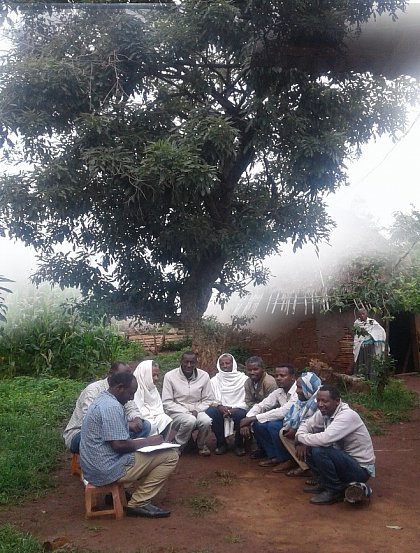
Mamo Feyissa Senbeta with participants of the focus group discussion
Mamo Feyissa Senbeta, a Ph.D. student from AAU, stayed from June 20 to August 31, 2019, in Metekel zone northwest Ethiopia with the aim of exploring the knowledge of the community about causation, and management of HIV/AIDS-associated illnesses and TB using medicinal plants. During the trip different methods of exploratory study design such as familiarization with traditional healers, focus group discussions, key informant interviews and guided field walks with healers were conducted. Herbarium specimen were collected and identification being carried out.
May 2019: Raphael Shedafa investigates the composition of tea (Camelia sinensis)
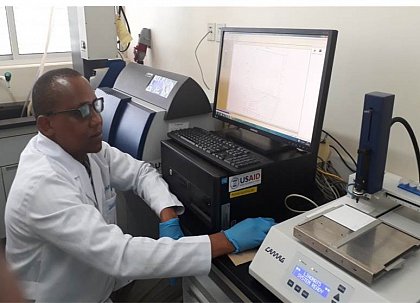
Mr. Shedafa works with the HPTLC in the laboratory of School of Pharmacy, MUHAS
MSc Raphael Shedafa, PhD student from MUHAS, Tanzania, investigates the
composition of Camellia sinensis L. Kuntze. The contents of amino acids,
polyphenols, and alkaloids are measured by high-performance thin-layer
chromatography (HPTLC) and near-infrared spectroscopy (NIRS).
The aim of the research work of Mr. Shedafa is to develop fast modern
quality control methods for tea and selected herbal medicines produced
and used in Tanzania.
May 2019: Alphonce Ignace Marealle visits the Hadzabe tribe in the central rift valley, Tanzania
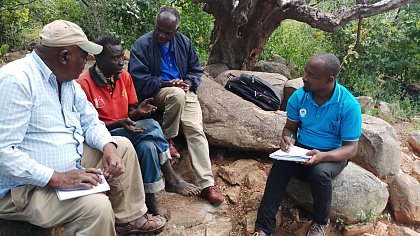
Mr. Marealle, Mr. Selemani and Dr. Anney interview a traditional healer
In May 2019, PhD student Alphonce Ignace Marealle, botanist Mr. Haji Selemani and district coordinator for traditional health services Dr. Josephat Anney interviewed one of the traditional healers from a tribe, that relies almost entirely on traditional medicines - the Hadzabe tribe in the central rift valley, Tanzania. The intension was to document plants used in the management of HIV/AIDS related conditions in Mbulu district, Manyara region.
In further progress of his research, Alphonce is going to test the extracts of the medicinal plants for their activity at the University of Botswana.
May 2019: Birhanu Nigusse Kahsay arrives in Halle for a one-month research stay
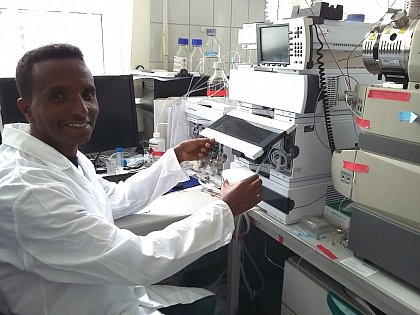
Birhanu Nigusse Kahsay working with LC-ESI/MS/MS at the IPB
Mr. Birhanu Nigusse Kahsay, PhD student from Addis Ababa, will determine free amino acids in Ethiopian plant material. He is being trained in the solid-phase extraction method (SPE) for the separation and detection of amino acids via LC-ESI/MS/MS. Mr. Kahsay works in the MLU Department of Pharmacy and the Leibniz Institute of Plant Biochemistry (IPB) in Halle, being supervised by Dr. Lucie Moeller.
We wish Mr. Kahsay a pleasant stay and many good results.
April 2019: Alphonce Ignace Marealle collects plant materials in the Makete district in Tanzania
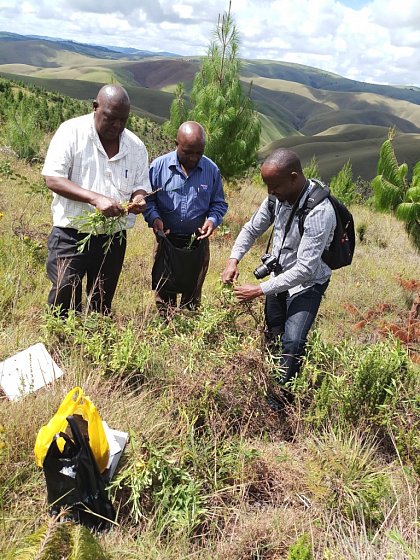
Mr. Marealle, Mr. Haji Selemani and Mr. Chawala collecting plant materials
PhD student Alphonce Ignace Marealle, botanist Mr. Haji Selemani and district coordinator for traditional health services Mr. Chawala collect plant materials in Makete district, one of the districts with the highest prevalence of HIV/AIDS in Tanzania. The plant on the picture is one of the medicinal plants mentioned by traditional healers in Makete for the treatment of HIV/AIDS.
April 2019: Two PhD students communicate scientific results to healers and collect plants
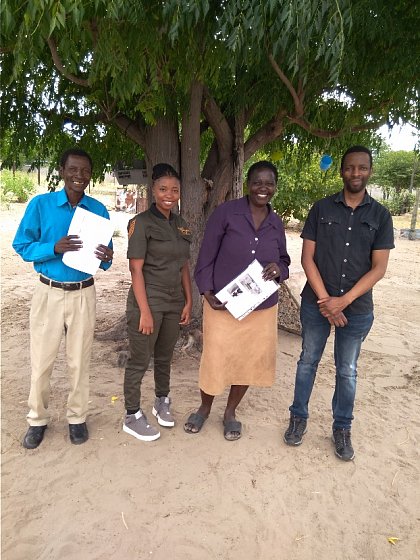
Ms. Raphane and Mr. Dube with traditional healers Rre and Mme Sephuthe in Maun
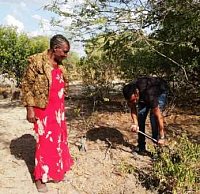
Mr. Dube is collecting a sample of a plant with the local name Motlhakola
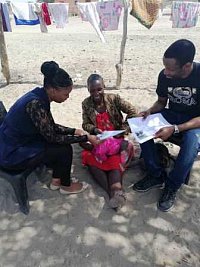
Ms. Raphane and Mr. Dube are showing the results of assays to the traditional healer Mme Tiroyakgosi
Boingotlo Raphane and Mthandazo Dube visited the traditional healers in the Maun region from April 8 to April 10, 2019 again.
One of the goals was to provide feedback to the healers who provided samples of medicinal plants to the PhD students in January 2019. Further objectives were to collect plant samples against intestinal worms that are used in the traditional medicine and to obtain more biomass of plants that showed good anthelmintic activity during the previous screening.
April 2019: Admassu Assen Adem from Addis Ababa University for a research stay at the MLU
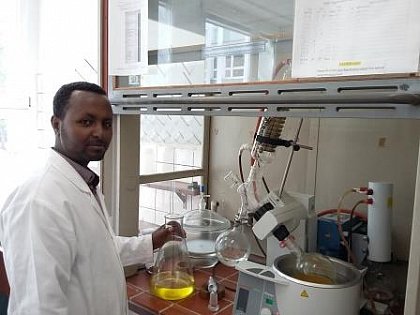
Admassu Assen Adem in an MLU laboratory
Mr. Admassu Assen MSc arrived in Halle on 6 April 2019 for a six-month
research stay to investigate alternative sources for phytoceramides, an
emerging class of pharmaceutical excipients. He will work in
laboratories of IADP and MLU.
We wish Admassu a successful research stay!
January 2019: Ms. Raphane and Mr. Dube visited traditional healers in Maun (Botswana)
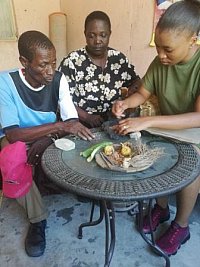
Boingotlo Raphane speaking with traditional healers Mr. Ngaka Mme Sephuthe and Mrs. Rre Sephuthe
(source: M. Dube)
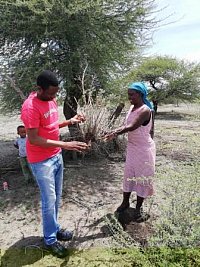
A traditional healer shows a medicinal plant to Mthandazo Dube
(source: B. Raphane)
From January 5 to 10, 2019, the PhD students Boingotlo Raphane and Mthandazo Dube visited traditional healers Mr. Ngaka Tiroyakgosi, Mr. Ngaka Mme Sephuthe and Mrs. Rre Sephuthe in the region Maun in North Botswana. The aim was to introduce the TRI-SUSTAIN project and to interview the healers on the medicinal plants that are traditionally used against HIV/AIDS and worm diseases.
The traditional healers were very interested in the objectives of the PhD works and gave the students several plant samples in order to be able to test their activities in the laboratories of University of Botswana (anti-HIV activity) and Leibniz Institute of Plant Biochemistry in Halle, Germany (anthelmintic activity).
We are very grateful that Mr. Ngaka Tiroyakgosi, Mr. Ngaka Mme Sephuthe and Mrs. Rre Sephuthe were willing to talk about their healing methods and to provide samples of medicinal plants to the PhD students.
November 2018: Third TRI-SUSTAIN Graduate School in Botswana
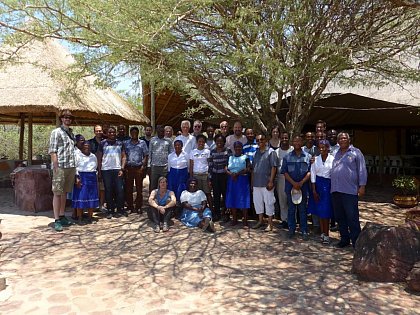
Visiting the traditional village of Mmangkodi
From November 11 to 16, 2018, all PhD students and most of the scientists in the Tri-Sustain project met for the third time for a Graduate School in the heart of Africa. After two workshops in Tanzania and Ethiopia, Botswana became the host country. The Graduate School focused on "Participatory research tools and culturally sensitive documentation methods to identify bioactive medicinal plants - Strategies for Innovation and Entrepreneurship". The participants were introduced to the main methods of dealing with traditional knowledge and ethnobotanical tasks. The legal framework for the use of traditional knowledge was discussed. The Graduate School was supplemented by overview lectures on the doctoral opportunities at Martin Luther University Halle-Wittenberg (MLU), and on the promotion of innovation and start-up towards sustainable entrepreneurship. The students themselves presented the progress of their work and used the opportunity for discussion with experts from relevant scientific fields. One day was spent in the village of Mmankgodi where the participants were introduced in social and ethnobotanical techniques with the help of the members of the Bahuruthshe Women's Cooperative and a traditional healer. To facilitate further cooperation, bilateral meetings were held by the Dean of the Faculty of Biosciences of MLU and Dean of the Science Faculty of the University of Botswana (UB). Representatives of the International Office of MLU and of the Technology Transfer of UB exchanged experiences and expressed an interest in expanding the cooperation between MLU and UB. Further opportunities for cooperation of Germany with African countries were discussed during a reception at the residence of the German Ambassador in Botswana, his Excellency Ralf Breth.
September 2018: Admassu Assen Adem from Ethiopia in Halle for research stay at IADP
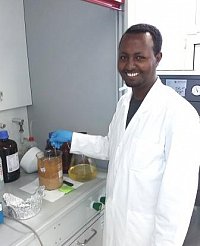
Admassu Assen Adem in the IADP lab
Admassu Assen Adem is a PhD student , financed by TRI-SUSTAIN, of Addis Ababa University. His thesis topic is "Use of Nanoemulgel for the Delivery of Phytoceramides and Essential Oils with Mosquito Repellent Activity". Admassu will research into phytoceramides from Ethiopian oats at the Institute for Applied Dermatopharmacy (IADP) in Halle under the supervision of Prof. Dr. Dr. h.c. Reinhard Neubert and Dr. Efrem Tessema. He will stay for two months.
August 2018: Prof. Dr. Ester Innocent from Tanzania has started her guest professorship at Martin Luther University in Halle
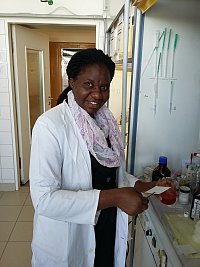
Prof. Dr. Ester Innocentin the MLU lab
Prof. Dr. Ester Innocent is the director of the Institute of Traditional Medicine at MUHAS, Tanzania. She was invited by MLU for two months as a guest professor. Prof. Innocent will give lectures on traditional medicine in Tanzania and East Africa for graduates in pharmacy, medicine and biochemistry. Furthermore, she will conduct research on extracts of Tanzanian medicinal plants which are used in traditional medicine for the treatment of tuberculosis.
August 2018: Mrs. Margot Weiler-Wohlfarth (DAAD) visits MUHAS (Tanzania)
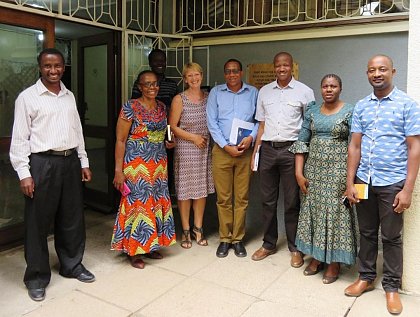
Visit of Mrs. Margot Weiler-Wohlfarth at MUHAS
(from right to left: Dr. Joseph Sempombe, Prof. Dr. Mary Justin-Temu, Dr. Joseph N. Otieno, Mrs. Margot Weiler-Wohlfarth, Mr. Raphael Shedafa, Prof. Dr. Eliangiringa Kaale, Prof. Dr. Ester Innocent, Mr. Alphonce Marealle)
Mrs. Weiler-Wohlfarth, a member of the German Academic Exchange Service (DAAD), visited the Tri-sustain cooperation partners at MUHAS on 10 August 2018. They shared information about the organizational issues and cooperation affairs of all project partners within the Tri-Sustain project. Mrs. Weiler-Wohlfarth praised the honest and open-minded atmosphere.
March 2018: Mthandazo Dube from Botswana arrived Halle for his research stay
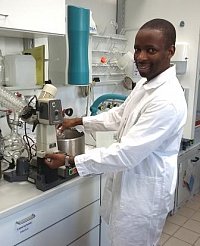
Mthandazo Dube
in the laboratory of IPB
Mthandazo Dube, a student from the University of Botswana, arrived in Halle on March 27, 2018. During his research stay, he will test traditional Botswana medicinal plants for their action against worm diseases. Mtha's workplace is at the Leibniz Institute of Plant Biochemistry.
March 2018: Second TRI-SUSTAIN Graduate School in Ethiopia
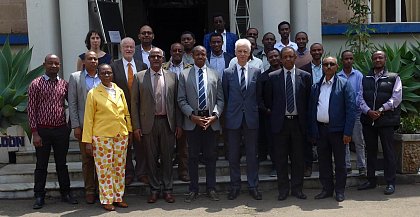
2nd TRI-SUSTAIN Graduate School in Addis Ababa
From 5 to 10 March 2018, the second postgraduate training of the TRI-SUSTAIN project took place in Addis Ababa, Ethiopia. The topic of the workshop was "Development of pharmaceutical plant-based formulations and characteristization of pharmaceutical excipients".
January 2018: Tanzanian PhD students visited Halle
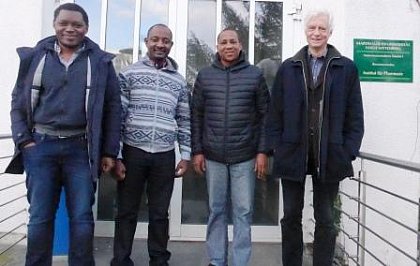
from left: Dr. Serge Fobofou, Mr. Alphonce Marealle, Mr. Raphael Shedafa, Prof. Dr. Peter Imming
Tanzanian PhD students Raphael Shedafa and Alphonce Marealle visited the TRI-SUSTAIN project partners in Halle in the period from 18 to 21 January 2018. They used the opportunity to see the Martin Luther University, the Institute of Applied Dermatopharmacy, as well as the Leibniz Institute of Plant Biochemistry.
November 2017: First TRI-SUSTAIN Graduate School in Tanzania
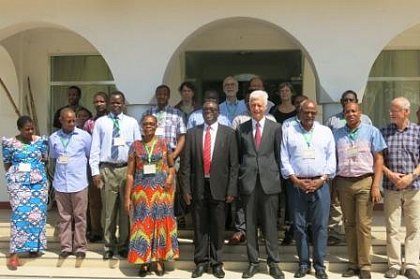
from the left: Prof. Dr. Ester Innocent (director of the Institute of Traditional Medicine at MUHAS), Dr. Marks Kgosimotse Ditlhogo (head of the Department of Biological Sciences at UB), Mthandazo Dube (PhD student at
the Institute of Pharmacy - UB, and IPB), Boingotlo Raphane (PhD student at UB), Alphonse Ignace Marealle (PhD student at MUHAS), Dr. Joseph Nicolao Otieno (head of the Department Medical Botany, Plant Breeding
and Agronomy at MUHAS), Prof. Dr. Mary Justin-Temu (Department of Pharmaceutics, School of Pharmacy MUHAS), Prof. Dr. Eliangiringa Kaale (School of Pharmacy at MUHAS), Dr. Ing. Lucie Moeller (PostDoc at the
Institute of Pharmacy, MLU), Prof. Andrew Pembe (Acting Deputy Vice Chancellor at MUHAS), Dr. Fidele Ntie-Kang (PostDoc at the Institute of Pharmacy, MLU), Prof. Dr. Dr. hc. Joachim Ulrich (Center for Engineering at
MLU), Dr. Serge Alain Fobofou Tanemassou (PostDoc at the Insitute of Pharmacy, MLU), Prof. Dr. Peter Imming (Project Leader, Institute of Pharmacy, MLU), Dr. Norbert Arnold (Department of Bioorganic Chemistry at
IPB), Prof. Dr. Kerstin Andrä-Marobela (Department of Biological Sciences at UB), Tesfaye Gabriel Dalalo (PhD student at the School of Pharmacy, AAU), Prof. Dr. Tsige Gebremariam Woldemariam (School of Pharmacy,
College of Health Sciences at AAU, Ethiopia), Mamo Feyissa Senbeta (PhD student at the School of Pharmacy, AAU), Raphael Shedafa (PhD student at MUHAS), Prof. Dr. Dr. hc. Reinhard Neubert (Institute for Applied
Dermatopharmacy, MLU)
Author: Norbert Arnold
From 14 to 18 November 2017, the first Graduate School of the Tri-Sustain project took place in Bagamoyo, Tanzania, near the metropolis of Dar-es-Salam. The young researchers involved in the project were introduced to preparatory work and analytical and therapeutic methods. Several plants were selected that should be tested for their healing effects and the cultivation of which should be finally pursued.
